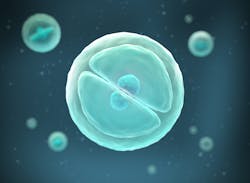Scientists have discovered a new protein which helps sperm fuse to an egg and is fundamental for human fertilization.
The new protein, named MAIA after the Greek goddess of motherhood, could be crucial in helping doctors better understand some aspects of infertility and develop novel treatments. Currently, infertility is unexplained in more than half of people who are unable to conceive naturally.
In the study, an international team of researchers led by the University of Sheffield created artificial eggs using thousands of beads. Each of these beads had a different piece of protein, known as a peptide, on its surface so that sperm could bond with them.
When sperm were incubated with the beads scientists found only a small number of beads had sperm attached to them. After several painstaking rounds of removing any beads that didn’t have sperm bound to them, researchers were eventually left with beads corresponding to one particular protein - MAIA - and sperm bound to all of these beads.
The gene corresponding to MAIA was then inserted into human culture cells, and these became receptive to sperm in the exact way that it would during the natural fertilization process.
The findings, published in Science Advances, reveal that during the process, MAIA is responsible for drawing sperm into the egg for fertilization.

